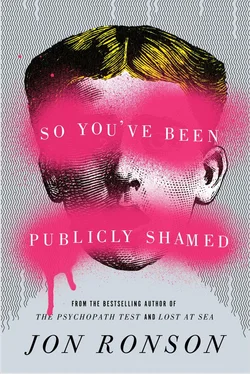• • •
Michael Fertik took me for dinner and he talked to me about the criticism that people often level at him, that “any change of search results is manipulating truth and chilling free speech.” He drank some wine. “But there is a chilling of behavior that goes along with a virtual lynching. There is a life modification.”
“I know,” I said. “For a year Lindsey Stone had felt too plagued to even go to karaoke.” And karaoke is something you do alone in a room with your friends.
“And that’s not an unusual reaction,” Michael said. “People change their phone numbers. They don’t leave the house. They go into therapy. They have signs of PTSD. It’s like the Stasi. We’re creating a culture where people feel constantly surveilled, where people are afraid to be themselves.”
“Like the NSA,” I said.
“This is more frightening than the NSA,” said Michael. “The NSA is looking for terrorists. They’re not getting psychosexual pleasure out of their schadenfreude about you.”
—
I wondered what to make of Michael’s Stasi analogy. There’s an old Internet adage that as soon as you compare something to the Nazis you lose the argument. Maybe the same could be said about the Stasi — the East Germans’ secret police force during the Cold War. They would, after all, creep into the homes of suspected enemies of the state and spray radiation onto them as they slept, their idea being to use the radiation as a tracking device. Stasi agents would follow them through crowds, pointing Geiger counters at them. A lot of suspected enemies of the state died of unusual cancers during the Stasi’s reign.
But the Stasi didn’t only inflict physical horror. Their main endeavor was to create the most elaborate surveillance network in world history. It didn’t seem unreasonable to scrutinize this aspect of them in the hope it might teach us something about our own social media surveillance network.
In Anna Funder’s seminal history of the Stasi— Stasiland —she interviews a woman named Julia who was one day called in for interrogation. The Stasi had intercepted love letters between her and her Western boyfriend. They were sitting on the officer’s desk in the interrogation room.
There was a pile of her letters to the Italian. There was a pile of his letters back to her. This man knew everything. He could see when she had doubts. He could see by what sweet-talking she had let herself be placated. He could see the Italian boyfriend’s longing laid bare.
Julia told Anna Funder that she was “definitely psychologically damaged” by the incident — the way the officer read through her letters in front of her, making little comments. “That’s probably why I react so extremely to approaches from men. I experience them as another possible invasion of my intimate sphere.”
Anna Funder wrote Stasiland back in 2003—fourteen years after the fall of the Stasi and three years before the invention of Twitter. Of course, no prurient or censorious bureaucrat had intercepted Justine Sacco’s private thoughts. Justine had tweeted them herself, laboring under the misapprehension — the same one I labored under for a while — that Twitter was a safe place to tell the truth about yourself to strangers. That truth telling had really proven to be an idealistic experiment gone wrong.
Anna Funder visited a Stasi officer whose job had been to co-opt informants. She wanted to know how — given that informant pay was terrible, and the workload was ever burgeoning, with more and more behaviors getting redefined as enemy activities — he managed to persuade people to get on board.
“Mostly people just said yes,” he told her.
“Why?” she asked him.
“Some of them were convinced of the cause,” he said. “But I think mainly because informers felt they were somebody, you know? Someone was listening to them for a couple of hours every week, taking notes. They felt they had it over other people.”
That struck me as a condescending thing for the Stasi man to say about his informants. And it would be a condescending thing to say about Twitter users too. Social media gives a voice to voiceless people — its egalitarianism is its greatest quality. But I was struck by a report Anna Funder discovered that had been written by a Stasi psychologist tasked with trying to understand why they were attracting so many willing informants. His conclusion: “It was an impulse to make sure your neighbor was doing the right thing.”
—
In October 2014, I took a final drive up to visit Lindsey Stone. Four months had passed since I’d last spoken to her or Farukh — I hadn’t called them and they hadn’t called me — and given that they’d taken her on only for my benefit, I’d half wondered if maybe it had all been quietly wound down in my absence.
“Oh God, no,” said Lindsey. We sat at her kitchen table. “They call me every week, week after week. You didn’t know that?”
“No,” I said.
“I thought you guys were talking all the time,” she said.
Lindsey got out her phone and scrolled through her innumerable e-mails from Farukh. She read out loud some blog posts his team had written in her voice, about how it’s important when traveling to use the hotel safe—“Stay alert, travelers!”—and how if you’re in Spain you should try the tapas.
Lindsey got to preapprove everything and she’d told them no only twice, she said: to the post about how much she was looking forward to Lady Gaga’s upcoming jazz album (“I like Lady Gaga, but I’m not really excited about her jazz album”) and to her tribute to Disneyland on the occasion of its fiftieth birthday: “Happy Birthday, Disneyland! The Happiest Place on Earth!”
“‘Happy Birthday, Disneyland!’” Lindsey blushed. “I would never… I mean, I had a great time at Disneyland…”
“Who doesn’t?” I said.
“But still…” Lindsey trailed off.
—
After we both laughed about the “Happy Birthday, Disneyland” blog post, we both stopped laughing and felt bad.
“They’re working so hard,” Lindsey said.
“And it’s what they have to do,” I said.
“Yeah,” Lindsey said. “One of my friends from high school said, ‘I hope it’s still you . I want people to know how funny you are.’ But it’s scary. After all that’s happened, what’s funny to me… I don’t want to go anywhere near the line, let alone cross it. So I’m constantly saying, ‘I don’t know, Farukh, what do you think?’”
“This journey started with my identity being hijacked by a spambot,” I said. “Your personality has been taken by strangers twice now. But at least this second time around it’s nice.”
—
Lindsey hadn’t typed her name into Google for eleven months. The last time had been a shock. It was Veterans Day and she discovered some ex — army people “wondering where I was, and not in a good way.”
“They were thinking about tracking you down so they could re-destroy you?” I asked.
“Yeah,” she said.
She hadn’t looked since. And now she swallowed and began to type: L… I… N…
—
Lindsey shook her head, stunned. “This is monumental,” she said.
Two years before, the photograph stretched to Google Images’ horizon — uninterrupted mass-production shaming, “pages and pages and pages,” Lindsey said, “repeating endlessly. It felt so huge. So oppressive.”
And now: gone.
Well — nearly gone. There was still a scattering of them, maybe three or four, but they were interspersed with lots of photographs of Lindsey doing nothing bad. Just smiling. Even better, there were lots of photographs of other Lindsey Stones — people who weren’t her at all. There was a Lindsey Stone volleyball player, a Lindsay Stone competitive swimmer (the different spelling didn’t seem to matter to Google Images). The swimmer had been captured mid-stroke, moments from winning the New York State 500-yard freestyle championship. The photo was captioned: “Lindsay Stone had the right plan in place and everything was going exactly to plan.”
Читать дальше












